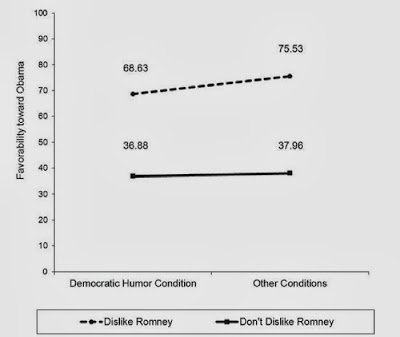Disposition, Political Parody, and the 2012 Election

Ever wonder about the impact of those political parody videos you were watching during the 2012 Election cycle? While you might have found it funny to see Barack Obama or Mitt Romney made fun of, were others finding these things funny as well? Was anybody else watching? A new article I just published in Human Communication Research addresses these questions and more by applying the disposition theory of humor to the study of both political parody appreciation and the effects of humor exposure. First, a little background: The Pew Research Center reports that 55% of all registered voters went online during the 2012 Election cycle to watch political video . 37% watched humorous or parody videos dealing with political issues. So yes, you weren't the only one watching those YouTube clips. The research featured in the HCR article is based on an experimental study that asked subjects to watch one of three sets of videos: a set that featured Democratic-directed humor, one set that inc...



